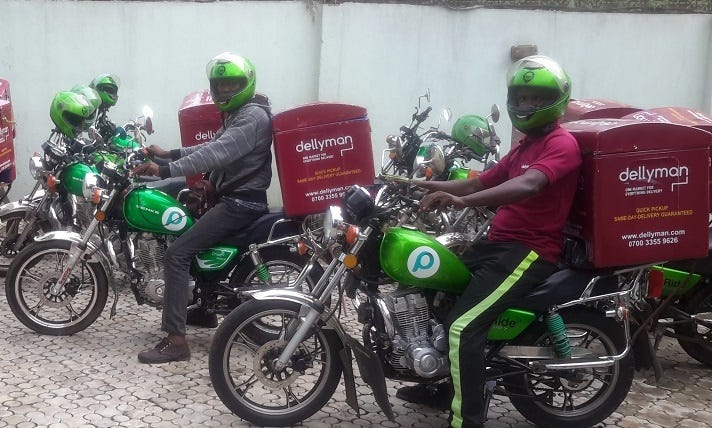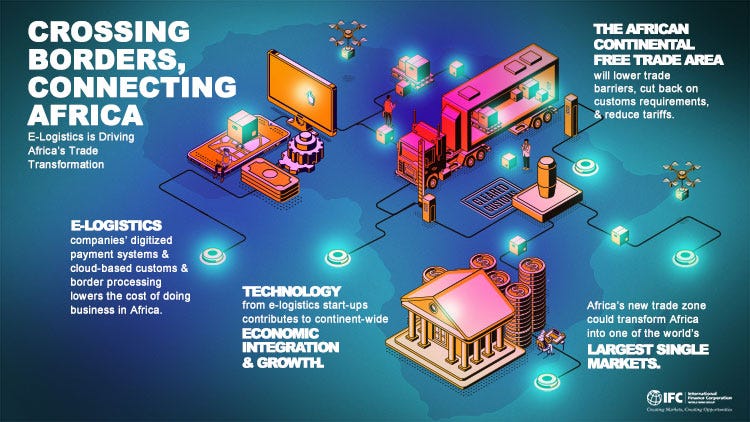Revolutionizing Africa's Last Mile Delivery: How Technology, Startups and Government Policies are shaping the future of delivery in 2023
Last-mile delivery is the system that makes the delivery of products to the end-user more streamlined, expedient and trouble-free
Greetings, Samson here.
And welcome to our first 2023 edition - a look at the African logistics landscape, zooming in on last-mile delivery. Enjoy!
Africa's last-mile delivery market is expected to see significant growth in the coming year, as more companies look to tap into the continent's booming e-commerce market. According to a report by ResearchAndMarkets, the African last-mile delivery market is projected to grow at a CAGR of over 10% during the forecast period of 2020 to 2025. A separate report by Strait Research suggests that "the Africa last-mile delivery market was valued at USD$1.4 billion in 2021 and expected to generate USD$2.3 billion by 2030 at a CAGR of 8.45%".
One major trend driving this growth is the increasing adoption of technology in the delivery process. From the use of drones and autonomous vehicles to the implementation of real-time tracking and delivery management systems, technology is helping to streamline and improve the last-mile delivery process.
Last-mile delivery is the system that makes the delivery of products to the end-user more streamlined, expedient and trouble-free
In addition, there is an increasing demand for same-day and express delivery services, as more consumers look to receive their online purchases as quickly as possible. In response, many delivery companies are investing in new technologies and infrastructure to meet this demand. Another trend is the growing popularity of cash on delivery (COD) as a payment method, which is particularly prevalent in Africa. This is because many consumers in the continent still do not have access to or trust other forms of online payments. Nor do they have full confidence that the product they ordered online will be the same when delivered or will work as advertised. Neither do they have full confidence that there will be a refund without a fight if the products are returned as promised in their policy.
Furthermore, with the advent of mobile technologies and the increasing availability of smartphones, more and more consumers in Africa are turning to online shopping, and this is driving demand for last-mile delivery services. According to a report by the GSMA, the number of mobile internet users in Africa is expected to reach 635 million by 2025. Still, on the African internet economy, a report produced by IFC and Google believes that; "By 2025, the Internet economy has the potential to contribute $180 billion to Africa’s economy growing to $712 billion by 2050"
Important Numbers. $154 billion in economic value will be generated by mobile technologies and services by 2025
The Last Mile Players.
Africa's last-mile delivery market is currently dominated by a few big players such as DHL, FedEx, and UPS, which have a strong presence in the continent. However, there are also many middle and small players operating in the market, such as Sendit, Kasha, Kwik Delivery and Twiga Foods.
In recent years, Africa has seen a rise in startups disrupting the last-mile delivery sector with innovative solutions. For example, companies like Sendy and Kobo360 use mobile technology to connect cargo owners with transport providers, while others like Glovo and Jumia Food focus on food and grocery delivery. These startups are leveraging technology and local knowledge to provide more efficient and cost-effective delivery services to consumers.
Quick Stats.
AfCFTA has the potential to unite a market of 1.3 billion people and a combined GDP of $2.6 trillion.
The African Government has a Role to Play.
The role of government policies in the growth of the last-mile delivery sector in Africa has been mixed. On one hand, some governments have implemented policies that have limited the growth of the sector, such as high taxes and tariffs on imported goods, and a lack of infrastructure. On the other hand, some governments have recognized the potential of the sector and have implemented policies to support its growth, such as providing funding for infrastructure development and encouraging private-public partnerships.
Logistics requires a significant base of physical assets, many of which require both initial and ongoing government funding and are subject to government regulations. - MIT
Existing Limitations.
One example of a government policy that has limited the growth of the sector is the lack of proper road infrastructure in some countries, which makes it difficult and expensive to transport goods. In contrast, in countries like Kenya, the government has implemented policies such as Vision 2030, which aims to improve transport infrastructure and increase connectivity, which in turn is expected to drive the growth of the last-mile delivery sector.
African e-logistics companies play a key role in AfCFTA by “reducing transport costs and delays and improving the quality of service along transport corridors. - IFC
For African governments to participate in the growth of the sector, they can create an enabling environment that encourages the growth of the sector through partnerships with private companies, foreign investors, and other stakeholders. These partnerships can focus on infrastructure development, technology adoption, and capacity building.
There's Finance Problem, also.
Access to finance is also a key factor in the growth of the last-mile delivery sector in Africa. Many small and medium-sized delivery companies in Africa struggle to access the finance they need to expand their operations and invest in technology. To overcome this challenge, governments and other stakeholders can support the development of financial products and services tailored to the needs of the last-mile delivery sector, such as microloans and crowdfunding platforms.
Interestingly, as proclaimed by an article by the A16Z team, every company will become a fintech company is becoming reality, even in logistics. For instance, Kobo360 - a tech-enabled digital logistics platform that aggregates end-to-end haulage operations., has a vendor financing VAS - Payfasta, enabling instant vendor payment at no extra cost. There's also Jetstream, which just raised $13 million - JetFinancing. There are many other logistics vendor financing companies if you do a Google search.
A Look at Last-Mile Delivery in Lagos, Nigeria.
There's an existing difficult business environment across the Sub-Saharan Africa region with unfavourable policies which especially affect smaller logistics businesses. This inadvertently has a significant negative impact on the flow of investment (low FDI too) as investors have doubts despite the massive potential opportunities. many logistic operators complained about insensitive policies being enforced for dispatch riders in Nigeria. For instance, in Lagos, licensing fees to range between $645 for SMEs like restaurants up to $51,000 for international courier companies, which are being enforced by a specialized arm of the Nigerian Postal Service (NIPOST) which is also a player in the industry.
There is also the issue of harassment by local government workers, enforcing payment from the riders by selling them tickets at almost every major bus stop they pass through.
This paper has amazing insights.
In conclusion. Africa's last-mile delivery market is expected to see significant growth in the coming year, driven by the adoption of technology, increasing demand for same-day and express delivery services, the popularity of cash-on-delivery (COD), and the increasing availability of smartphones. The big players in the sector are DHL, FedEx, and UPS, while there are also many middle and small players. Startups are also disrupting the sector with innovative solutions. Government policies have both positive and negative impacts on the growth of the sector, and African governments can participate in a way of partnerships to drive its growth in 2023. Access to finance is also a key factor in the growth of the last-mile delivery sector in Africa.
More interesting reads:
ResearchAndMarkets: Africa Last Mile Delivery Market - Growth, Trends, and Forecast (2020-2025) (https://www.researchandmarkets.com/reports/4424063/africa-last-mile-delivery-market-growth-trends)
GSMA: The Mobile Economy Sub-Saharan Africa 2020 (https://www.gsma.com/mobileeconomy/sub-saharan-africa/)
IFC: Navigating Africa’s New Logistics Landscape (https://www.ifc.org/wps/wcm/connect/news_ext_content/ifc_external_corporate_site/news+and+events/news/cm-stories/africa-logistics-landscape)
MDPI: Logistics Challenges in Sub-Saharan Africa and Opportunities for Digitalization (https://www.mdpi.com/2071-1050/14/4/2399)
About The Edition.
The Edition is a deep dive into any helpful topic, trend or story making rounds in the tech space. We try to bring clarity to you every Saturday, at 8am. Sometimes, it’s quick bites of helpful advice.
Cheers!
This Edition by Sam.
For Adverts, send us an email - at giantaffairs@gmail.com OR call - 08074727030 | See Africa Tech Memo Ad Rate






